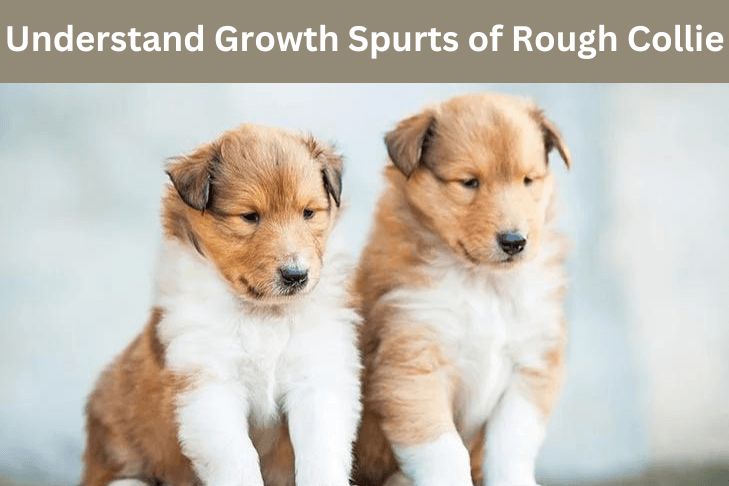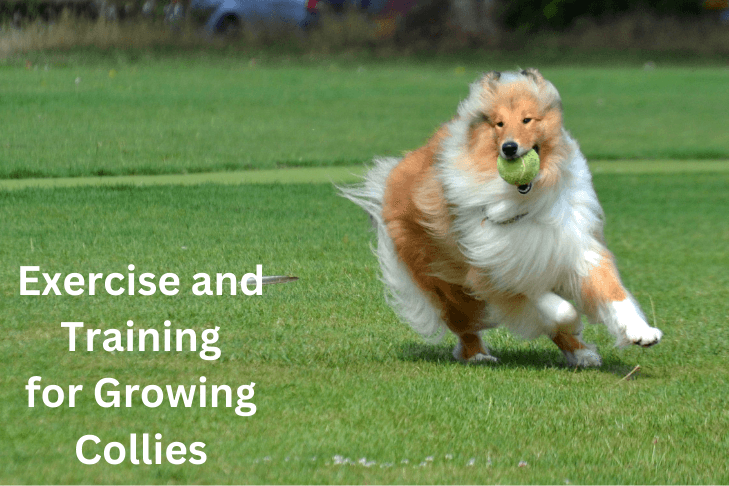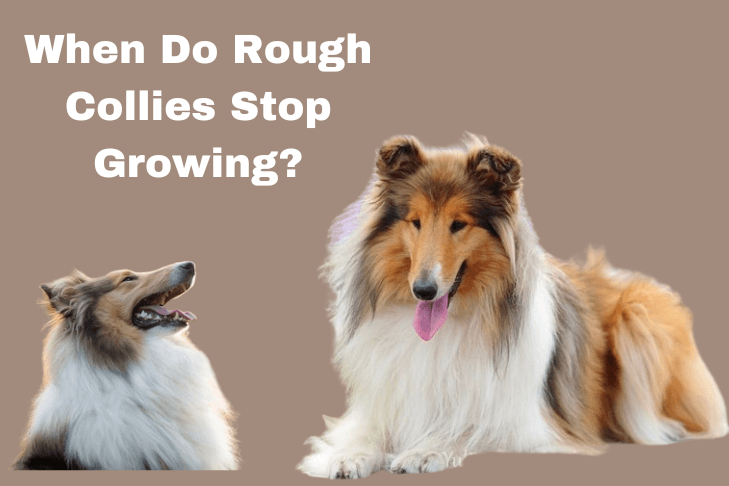Rough collies are a beautiful and intelligent breed of dogs that originated from Scotland. They are known for their long, flowing coats, elegant appearance, and loyal personality. If you are a proud owner of a rough collie puppy, you might be wondering When do rough collies stop growing? and reach their adult size.
specifically focusing on the Rough Collie growth process. As the proud owners of these fluffy companions, it’s crucial to grasp not just the physical changes they undergo but also the love and care they need during these transformative years.
Rough Collie growth, a journey filled with rapid changes and delightful milestones, is a path we walk alongside our pets, witnessing their evolution from playful puppies to majestic, mature dogs.
Whether you’re a seasoned Rough Collie owner or considering adding one to your family, this guide is tailored to help you navigate through their growth stages with ease and confidence. So, let’s dive into the fascinating world of Rough Collies and learn together how to ensure their journey into adulthood is as joyful and healthy as it can be.
Contents
- 1 When do rough collies stop growing? The Basics
- 2 Health and Nutrition During Growth
- 3 Exercise and Training for Growing Collies
- 4 Socialization and Mental Health
- 5 When Do They Stop Growing?
- 6 How much do border collies grow after 6 months?
- 7 How Big Do Rough Collies Get?
- 8 When do female rough collies stop growing
- 9 How to Ensure Your Rough Collie’s Healthy Growth
- 10 Conclusion
When do rough collies stop growing? The Basics
Understanding the Rough Collie’s growth stages is akin to having a roadmap for your pet’s development. It’s not just about their size; it’s about knowing what to expect and how to support them through each phase.
What to Expect in the First Year
The first year is a rollercoaster of growth and change. Your Rough Collie puppy will transform before your eyes. Initially, they’ll be a bundle of fluff, but by the end of the year, they’ll be well on their way to adulthood.
Rough Collie puppy care during this phase is critical. It involves balanced nutrition, adequate exercise, and lots of love. You’ll notice rapid physical changes, especially if you’re keeping an eye on a Rough Collie growth chart. They’ll gain weight, their coat will develop, and they’ll start showing their unique personality.
Understanding Growth Spurts
Growth spurts in Rough Collies can be surprising. One week they’re a certain size, and seemingly overnight, they’ve outgrown their bed. During these spurts, your puppy might seem endlessly hungry. Adjusting their diet to accommodate this increase in appetite is part of the effective feeding of Rough Collie puppies.
Watch out for signs of discomfort or pain during these growth spurts, as it can indicate underlying Rough Collie health issues. Regular vet check-ups are vital during this time to ensure they are growing healthily.

Health and Nutrition During Growth
A crucial aspect of Rough Collie’s development is ensuring they receive the right nutrition and health care. This not only supports their physical growth but also lays the foundation for a healthy, active life.
Feeding Your Growing Rough Collie
When it comes to feeding Rough Collie puppies, balance is key. A diet rich in essential nutrients supports their rapid growth and helps in building strong bones and muscles. It’s important to follow a feeding schedule that aligns with their growth needs.
Consult with your veterinarian to choose the best diet, and consider incorporating puppy-specific formulas that cater to the nutritional needs during the different growth stages of a Rough Collie. Remember, overfeeding can be as harmful as underfeeding, leading to obesity and related health issues.
Common Health Concerns
Rough Collies are generally healthy, but like all breeds, they have certain predispositions to specific health conditions. Being aware of common Rough Collie health issues can help in early detection and treatment.
Hip dysplasia, eye problems, and bloat are some concerns to watch out for. Regular health check-ups, vaccinations, and preventive care play a significant role in your Rough Collie’s well-being. Also, pay attention to their dental health, coat condition, and any signs of allergies or skin irritations.
Exercise and Training for Growing Collies
A well-rounded approach to Rough Collie puppy care involves more than just health and nutrition; it also includes proper exercise and training. This not only keeps them physically fit but also aids in their mental development and social skills.
Exercise Needs
Exercise is vital for your growing Rough Collie, but it’s important to tailor it to their age and growth stage. Puppies have a lot of energy, but their bones and joints are still developing, so it’s crucial to avoid overly strenuous activities. As they grow, you can gradually introduce more challenging exercises.
Activities like brisk walks, gentle fetch games, and obstacle courses can be great for Rough Collie exercise needs. Remember, a well-exercised Collie is a happy and healthy one!
Training Through the Growth Phases
Training should start early and be consistent throughout the Rough Collie growth stages. Puppyhood is the ideal time to instill basic commands and house training. As they grow, you can introduce more advanced training techniques.
Keep in mind that Rough Collies are intelligent and respond well to positive reinforcement. Training Rough Collie puppies requires patience, consistency, and understanding. It’s not just about teaching them commands, but also about building a bond of trust and respect between you and your pet.

Socialization and Mental Health
An often-overlooked aspect of Rough Collie development is their socialization and mental well-being. A well-socialized Collie is not just a joy to be around but also tends to be healthier and happier.
The Importance of Socialization
Socializing your Rough Collie is crucial, especially in their early months. This includes introducing them to a variety of people, pets, and environments. Proper socialization can prevent behavior problems later in life and ensure your Collie is comfortable in different situations.
Activities like visiting dog parks, having playdates, and even simple walks in the neighborhood contribute to socializing Rough Collies effectively. Remember, positive experiences during these early stages can shape their temperament and behavior as adults.
Mental Stimulation and Bonding
Mental stimulation is as important as physical exercise for a Rough Collie. Engaging their minds through interactive games, training challenges, and puzzle toys can prevent boredom and destructive behavior. It’s also a fantastic way to strengthen your bond with them.
Regular training sessions, teaching new tricks, and providing a variety of toys are great for their mental stimulation. Through these activities, you’re not just taking care of their physical health, but you’re also nurturing a well-rounded, emotionally stable Collie.
When Do They Stop Growing?
One of the most common questions among Rough Collie owners is about understanding when their pets reach physical and emotional maturity. Knowing this helps in adjusting care and expectations accordingly.
Physical Maturity
Rough Collies typically reach their full size between 18 to 24 months. However, this can vary slightly depending on genetics and environmental factors. Observing signs that your Rough Collie has stopped growing can include monitoring changes in height and weight.
It’s important to remember that even after reaching their full height, they might continue to fill out and gain muscle mass. Regular vet visits and monitoring are crucial in keeping track of their growth and ensuring they are on the right track.
Emotional Maturity
Emotional development in Rough Collies is just as significant as their physical growth. They usually reach emotional maturity around the age of 2 to 3 years. During this time, you might notice a change in their behavior as they become more settled and less puppy-like.
Understanding Rough Collie’s emotional development is key to adjusting your training and socialization methods to support them in becoming well-adjusted adults.
How much do border collies grow after 6 months?
Border Collies continue to grow after 6 months, but their growth rate slows down compared to the rapid growth seen in their first few months. Typically, they reach about 75% of their adult height by six months. However, they will continue to fill out and gain muscle mass until they are about 12-15 months old.
In terms of weight, it’s important to remember that individual growth can vary based on diet, genetics, and overall health. Here’s a general weight chart to help you understand the growth of Border Collies:
May Your Most Favorite Dogs Breed
How Big Do Rough Collies Get?
According to the American Kennel Club (AKC), the standard size for a rough collie is:
- Height: 22 to 26 inches at the shoulder
- Weight: 50 to 75 pounds
However, these are only averages, and your rough collie might be slightly smaller or larger depending on its genetics, nutrition, and health. Some rough collies can weigh as little as 40 pounds or as much as 90 pounds.
How to Track Your Rough Collie’s Growth
The best way to track your rough collie’s growth is to weigh and measure it regularly and compare it to a rough collie growth chart. A rough collie growth chart is a table that shows the average weight and height of rough collies at different ages. You can use this chart to see if your rough collie is growing normally or if it is underweight or overweight.
Here is the Border Collie weight chart in a table format for better understanding:
| Age | Males Weight | Females Weight |
| 3 months | 6-9 kg (13-20 lbs) | 5-8 kg (11-17 lbs) |
| 6 months | 10-14 kg (22-31 lbs) | 9-12 kg (19-26 lbs) |
| 9 months | 13-17 kg (28-37 lbs) | 11-15 kg (24-33 lbs) |
| 12 months (1 year) | 14-20 kg (30-44 lbs) | 12-18 kg (26-39 lbs) |
| 15 months | 15-22 kg (33-48 lbs) | 13-19 kg (28-42 lbs) |
| Adult | 15-22 kg (33-48 lbs) | 13-19 kg (28-42 lbs) |
When do female rough collies stop growing
Female Rough Collies typically stop growing in physical size around 18 to 24 months of age. However, it’s important to note that while they may reach their full height by this age, they might continue to ‘fill out’ in terms of muscle and body mass for a bit longer.
Every dog is unique, so there can be some variation based on genetics, health, and environmental factors. Even after reaching physical maturity, Rough Collies continue to develop emotionally and mentally well into their third year, which is an essential aspect of their overall growth and development.
Regular check-ups with a veterinarian can provide more personalized insights into a Rough Collie’s growth and overall health.
How to Ensure Your Rough Collie’s Healthy Growth
To ensure your rough collie’s healthy growth, you need to provide it with a balanced diet, regular exercise, and proper care. Here are some tips to follow:
- Feed your rough collie a high-quality dog food that is suitable for its age, size, and activity level. Avoid foods that contain corn, soy, or wheat as they can cause allergies or digestive issues in some collies. You can also add some fresh meat, vegetables, or fruits to your rough collie’s diet as treats or supplements.
- Feed your rough collie twice a day, once in the morning and once in the evening. Avoid feeding your rough collie once a day or leaving food out all day, as this can increase the risk of bloat, a life-threatening condition that occurs when the stomach twists and fills with gas. You can also elevate your rough collie’s food and water bowls to prevent it from swallowing too much air while eating or drinking.
- Monitor your rough collie’s weight and body condition regularly. You can use a body condition score chart to see if your rough collie is too thin, too fat, or just right. Ideally, you should be able to feel your rough collie’s ribs and spine, but not see them. You should also see a slight waistline when you look at your rough collie from above and a tuck-up when you look at it from the side.
- Exercise your rough collie daily for at least 30 to 60 minutes. Rough collies are active and energetic dogs that need physical and mental stimulation to stay healthy and happy. You can take your rough collie for walks, hikes, runs, or play fetch, frisbee, or agility with it. You can also teach your rough collie tricks, commands, or games to challenge its intelligence and keep it entertained.
- Groom your rough collie regularly to keep its coat clean, shiny, and healthy. Rough collies have a double coat that consists of a soft undercoat and a harsh outer coat. You need to brush your rough collie at least once a week to remove loose hair, dirt, and mats. You also need to trim your rough collie’s nails, clean its ears, and brush its teeth as needed.
- Take your rough collie to the vet for regular check-ups, vaccinations, deworming, and flea and tick prevention. You should also spay or neuter your rough collie to prevent unwanted pregnancies, reduce the risk of certain cancers, and improve its behavior. You should also be aware of the common health issues that affect rough collies, such as collie eye anomaly, hip dysplasia, dermatomyositis, and drug sensitivity, and consult your vet if you notice any signs of illness or injury in your rough collie.
Conclusion
In this piece of knowledge, you understand the When do rough collies stop growing? From the fluffy and energetic puppy stage to the dignified and composed adult phase, each step in your Collie’s life is unique and special.
Remember, the key to raising a healthy and happy Rough Collie lies in balancing nutrition, exercise, socialization, and training, tailored to their growth stages. As owners, we’re not just caretakers; we’re the guiding hands shaping their lives.
Whether you’re a first-time Rough Collie parent or a seasoned pro, embracing this journey with patience and love makes all the difference. Your efforts in understanding and meeting their needs will foster a strong, enduring bond, making your Rough Collie a beloved member of your family.
Feel free to revisit this guide whenever you need a refresher on Rough Collie development. And always, always cherish every moment with your furry companion – they grow up so fast!
FAQs about When do rough collies stop growing?
1. Q: At what age is a Rough Collie fully grown?
Answer: Rough Collies typically reach their full height by 18 to 24 months old, but they may continue to fill out and gain muscle mass for some time after that. Emotional and mental maturity often occurs around 2 to 3 years of age.
2. Q: How big do Rough Collies get when they’re fully grown?
Answer: Adult male Rough Collies usually weigh between 60 to 75 pounds and stand about 24 to 26 inches tall at the shoulder. Females are slightly smaller, typically weighing 50 to 65 pounds and standing 22 to 24 inches tall.
3. Q: What are common health issues in Rough Collies?
Answer: While generally healthy, Rough Collies can be prone to certain health issues like hip dysplasia, Collie Eye Anomaly, and dermatomyositis. Regular veterinary check-ups and a healthy lifestyle can help manage these conditions.
4. Q: How often should Rough Collies be fed?
Answer: The feeding schedule for Rough Collies varies with age. Puppies typically require three to four small meals a day, while adults do well with two meals a day. It’s important to follow vet-recommended diets and adjust portions based on activity level and health needs.
5. Q: Are Rough Collies good with children and other pets?
Answer: Yes, Rough Collies are known for their gentle and friendly nature, making them excellent companions for children and other pets. Proper socialization from a young age is key to fostering positive interactions with other animals and people.




